Posted on April 2nd, 2012 by Mary Lord
 Engineering researchers who toil in the field of sanitation, especially sanitation for the world’s poorest citizens, used to find that their field carried about as much cachet as a fly-ridden latrine. Not anymore. In July, 2011, the Bill & Melinda Gates Foundation announced eight grants totaling $3 million for university engineering projects to “Reinvent the Toilet.”
Engineering researchers who toil in the field of sanitation, especially sanitation for the world’s poorest citizens, used to find that their field carried about as much cachet as a fly-ridden latrine. Not anymore. In July, 2011, the Bill & Melinda Gates Foundation announced eight grants totaling $3 million for university engineering projects to “Reinvent the Toilet.”
Read More
Filed under: Special Features | Comments Off on Feature: Bill Gates Wants to Reinvent Toilets
Tags: Clean Water, Grand Challenges, Waste management, Water, Water management
Posted on February 13th, 2012 by Mary Lord
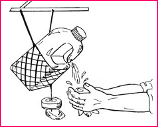 In this service-learning activity, teams of students in grades 10-12 learn the basic principles of fluid dynamics by designing and testing a prototype system to pipe water from a storage tank to a Tippy Tap hand-washing station similar to inexpensive homemade devices used extensively in the developing world.
In this service-learning activity, teams of students in grades 10-12 learn the basic principles of fluid dynamics by designing and testing a prototype system to pipe water from a storage tank to a Tippy Tap hand-washing station similar to inexpensive homemade devices used extensively in the developing world.
Read More
Filed under: Class Activities, Grades 9-12, Grades 9-12, Grades 9-12, Lesson Plans | Comments Off on Lesson: Tippy Tap Hand-Washer
Tags: Agricultural Engineering, Bernoulli, Class Activities, developing nation, energy conservation, Environmental Engineering, fluid dynamics, Grades 9-12, Lesson Plan, pipe systems, pipes, pressure, sanitation, service learning, velocity, Water
Posted on March 13th, 2011 by Jaimie Schock
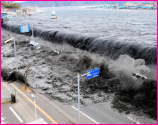 Water is surprisingly heavy, and, when in motion, it can kill. The tsunami that hit Northern Japan on Friday is an eye-opening example of the power water can have—and the devastation it can bring. “It’s basically like a hundred tanks coming across you,” oceanography professor Philip Froelich says.
Water is surprisingly heavy, and, when in motion, it can kill. The tsunami that hit Northern Japan on Friday is an eye-opening example of the power water can have—and the devastation it can bring. “It’s basically like a hundred tanks coming across you,” oceanography professor Philip Froelich says.
Read More
Filed under: Special Features | Comments Off on Feature: Tsunami Waves’ Destructive Power
Tags: Japan, Ocean, Ocean science, Physics, Water
Posted on October 11th, 2010 by ASEE
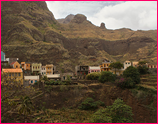 In this lesson from the Peace Corps, students in grades 4-12 learn how harvesting water from fog can help people who have limited access to fresh water. They study the water challenges in Cape Verde, and the technology and benefits of fog water collectors. They then build and evaluate a own working model.
In this lesson from the Peace Corps, students in grades 4-12 learn how harvesting water from fog can help people who have limited access to fresh water. They study the water challenges in Cape Verde, and the technology and benefits of fog water collectors. They then build and evaluate a own working model.
Read More
Filed under: Grades 6-8, Grades 9-12, Grades K-5, Lesson Plans | 1 Comment »
Tags: Clean Water, Environmental Engineering, Grades 4-12, Peace Corps Cape Verde, Water
Posted on September 13th, 2010 by ASEE
 This lesson engages students in grades 6-8 in an electrolysis activity separating hydrogen and oxygen to help them understand how hydrogen is created to be used as an energy source.
This lesson engages students in grades 6-8 in an electrolysis activity separating hydrogen and oxygen to help them understand how hydrogen is created to be used as an energy source.
Read More
Filed under: Grades 6-8, Lesson Plans | 3 Comments »
Tags: Electrical, Electrical Engineering, Lesson Plan, Water
Posted on June 21st, 2010 by ASEE
 If you’re fortunate enough to live near a beach or sandy banks or dunes, this sand-castle construction lesson from the Great Sand Dunes National Park and Preserve will both instruct and entertain, helping your students understand the cohesive force of water tension and the adhesive force of capillary action.
If you’re fortunate enough to live near a beach or sandy banks or dunes, this sand-castle construction lesson from the Great Sand Dunes National Park and Preserve will both instruct and entertain, helping your students understand the cohesive force of water tension and the adhesive force of capillary action.
Read More
Filed under: Grades 6-8, Grades 6-8, Grades K-5, Grades K-5, K-12 Outreach Programs, Lesson Plans | 1 Comment »
Tags: capillary action, Chemical Engineering, erosion, Grades 3-8, Great Sand Dunes National Park, Lesson Plan, sand and water, Water
Posted on June 7th, 2010 by Jaimie Schock
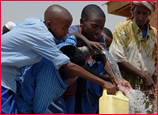 Three rivers run through Pittsburgh, so it is blessed with an abundance of potable water. But 3 billion people across the globe, nearly half the world’s population, don’t have ready access to fresh water. That was the lesson driven home to 550 high school students at a recent daylong tutorial sponsored by the World Affairs Council of Pittsburgh.
Three rivers run through Pittsburgh, so it is blessed with an abundance of potable water. But 3 billion people across the globe, nearly half the world’s population, don’t have ready access to fresh water. That was the lesson driven home to 550 high school students at a recent daylong tutorial sponsored by the World Affairs Council of Pittsburgh.
Read More
Filed under: K-12 Education News | Comments Off on Students Converge to Talk Water
Tags: Clean Water, Public Policy, Water, Water management, Water Resources
Posted on January 6th, 2010 by ASEE
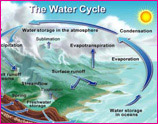
As part of its material on global change and Virginia watersheds, the Science Museum of Virigina presents “The Water Cycle,” describing the movement of water, and linking to an animation from the Environmental Protection Agency. See also the helpful glossary of terms.
Read More
Filed under: Web Resources | Comments Off on Website: The Water Cycle
Tags: Science museum, Water, Website
Posted on January 5th, 2010 by ASEE

The Running Dry Website offers a number of helpful resources for educators, including: background information, classroom activities, “ten ways to save water,” and “more tips on saving water,” and a list of online resources.
Read More
Filed under: Web Resources | Comments Off on Website: Running Dry – Water Awareness
Tags: Class Activities, Conservation, Environmental science, Water, Web Resources
 Engineering researchers who toil in the field of sanitation, especially sanitation for the world’s poorest citizens, used to find that their field carried about as much cachet as a fly-ridden latrine. Not anymore. In July, 2011, the Bill & Melinda Gates Foundation announced eight grants totaling $3 million for university engineering projects to “Reinvent the Toilet.”
Engineering researchers who toil in the field of sanitation, especially sanitation for the world’s poorest citizens, used to find that their field carried about as much cachet as a fly-ridden latrine. Not anymore. In July, 2011, the Bill & Melinda Gates Foundation announced eight grants totaling $3 million for university engineering projects to “Reinvent the Toilet.”








 In this service-learning activity, teams of students in grades 10-12 learn the basic principles of fluid dynamics by designing and testing a prototype system to pipe water from a storage tank to a Tippy Tap hand-washing station similar to inexpensive homemade devices used extensively in the developing world.
In this service-learning activity, teams of students in grades 10-12 learn the basic principles of fluid dynamics by designing and testing a prototype system to pipe water from a storage tank to a Tippy Tap hand-washing station similar to inexpensive homemade devices used extensively in the developing world. Water is surprisingly heavy, and, when in motion, it can kill. The tsunami that hit Northern Japan on Friday is an eye-opening example of the power water can have—and the devastation it can bring. “It’s basically like a hundred tanks coming across you,” oceanography professor Philip Froelich says.
Water is surprisingly heavy, and, when in motion, it can kill. The tsunami that hit Northern Japan on Friday is an eye-opening example of the power water can have—and the devastation it can bring. “It’s basically like a hundred tanks coming across you,” oceanography professor Philip Froelich says. In this lesson from the Peace Corps, students in grades 4-12 learn how harvesting water from fog can help people who have limited access to fresh water. They study the water challenges in Cape Verde, and the technology and benefits of fog water collectors. They then build and evaluate a own working model.
In this lesson from the Peace Corps, students in grades 4-12 learn how harvesting water from fog can help people who have limited access to fresh water. They study the water challenges in Cape Verde, and the technology and benefits of fog water collectors. They then build and evaluate a own working model. This lesson engages students in grades 6-8 in an electrolysis activity separating hydrogen and oxygen to help them understand how hydrogen is created to be used as an energy source.
This lesson engages students in grades 6-8 in an electrolysis activity separating hydrogen and oxygen to help them understand how hydrogen is created to be used as an energy source. If you’re fortunate enough to live near a beach or sandy banks or dunes, this sand-castle construction lesson from the Great Sand Dunes National Park and Preserve will both instruct and entertain, helping your students understand the cohesive force of water tension and the adhesive force of capillary action.
If you’re fortunate enough to live near a beach or sandy banks or dunes, this sand-castle construction lesson from the Great Sand Dunes National Park and Preserve will both instruct and entertain, helping your students understand the cohesive force of water tension and the adhesive force of capillary action. Three rivers run through Pittsburgh, so it is blessed with an abundance of potable water. But 3 billion people across the globe, nearly half the world’s population, don’t have ready access to fresh water. That was the lesson driven home to 550 high school students at a recent daylong tutorial sponsored by the World Affairs Council of Pittsburgh.
Three rivers run through Pittsburgh, so it is blessed with an abundance of potable water. But 3 billion people across the globe, nearly half the world’s population, don’t have ready access to fresh water. That was the lesson driven home to 550 high school students at a recent daylong tutorial sponsored by the World Affairs Council of Pittsburgh.
